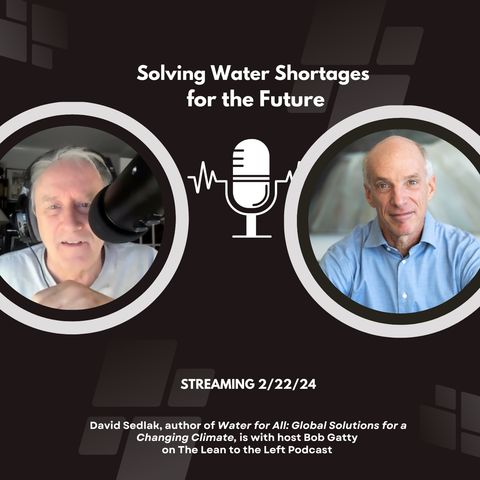Water for All: Challenges of a Changing Climate

Download and listen anywhere
Download your favorite episodes and enjoy them, wherever you are! Sign up or log in now to access offline listening.
Water for All: Challenges of a Changing Climate
This is an automatically generated transcript. Please note that complete accuracy is not guaranteed.
Description
As we see in news headlines and in our own neighborhoods, water crises are more frequent and increasingly severe, and the world’s approach to providing the water that grows food,...
show moreBut the grim news reports of empty reservoirs, withering crops, failing ecosystems need not be cause for despair, argues award-winning author and environmentalist David Sedlak, who is with us on the Lean to the Left podcast.
In Water for All: Global Solutions for a Changing Climate, just published by Yale University Press, Sedlak identifies the challenges society faces, including ineffective policies and outdated infrastructure, and the many tools at our disposal.
He offers an informed and hopeful approach for changing the way water is managed so we can create a future with clean, abundant, and affordable water for all.
Sedlak is the Plato Malozemoff Professor of Civil and Environmental Engineering at the University of California, Berkeley, and director of the Berkeley Water Center. He is author of the award-winning Water 4.0: The Past, Present, and Future of the World’s Most Vital Resource.
"Climate change combined with global development is going to result in (water) crises happening more frequently and being more severe," Sedlak says, "but at the same time, the knowledge that we've accumulated and the technologies that we've developed and are developing give us new answers.
"(It) depends a lot upon whether we can let go of some of our preconceived notions about how we manage water and take a different path forward in," he adds. "And I think that if we're capable of doing that; if we're capable about seeing this as a time when the status quo no longer works and we have to try something different, there's a chance to come out in a much better place."
Here are some key questions we discussed regarding water challenges of a changing climate:
Q. Your book starts off discussing the six separate water crises that exist today. How about discussing them?
Q. So what are the solutions to these crises?
Q. What can be learned from communities that have experienced water crises and the actions they have taken?
Q. You talk about the wealthy and their ability to cope with water shortages. But what about those less fortunate like the urban poor and those in rural communities?
Q. How can emerging technologies unlock untapped water resources without damaging the environment?
Q. You discuss some ideas to expand conventional and unconventional water sources. What are some of the most promising ideas there?
Q. Are there places in the world that are practicing good water usage? What can we learn from them?
Q. So where do we go next to ensure the best outcome? How do we tackle these areas in concrete, strategic ways?
Q. Your last book, Water 4.0, looked at the history of water systems. What did you learn in the decade between Water 4.0 and now that made you want to write this book?
Q. Where can people find your book?
Information
| Author | Bob Gatty |
| Organization | Bob Gatty |
| Website | podcast.leantotheleft.net |
| Tags |
Copyright 2024 - Spreaker Inc. an iHeartMedia Company

Comments